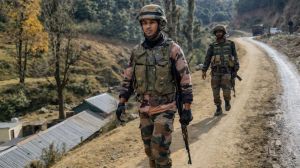Build on the beginning
Expressions of satisfaction about the completion of free and fair elections in Jammu and Kashmir had to take a backseat to competing claims ...

Expressions of satisfaction about the completion of free and fair elections in Jammu and Kashmir had to take a backseat to competing claims for chief ministership by the Congress and the People8217;s Democratic Party PDP. The PDP8217;s reasoning was that it has emerged as a major political force in the Valley, an alternative to the National Conference. The PDP is a regional party and therefore its leading the government would increase the credibility of the government, it said, inside J038;K and outside it. The PDP also claimed that its manifesto was the most responsive to the aspirations of the people.
The Congress countered that it had a larger number of seats in the legislative assembly than the PDP; it has greater support from independent MLAs; and that Congress being the national party, its assuming the chief ministership of the state would be a more effective counter to separatist elements. The PDP8217;s leadership does not have sufficient appeal in Jammu and Ladakh. In addition, the Congress legitimately claimed that it has greater experience in governance and in dealing with terrorism and secessionism and therefore would be more capable of bringing J038;K back to the mainstream.
Ultimately, the Congress showed greater sensitivity to the more pertinent considerations of national interests and of the well-being of the people. It agreed to the PDP, led by Mufti Mohammed Sayeed, leading the new government. The information available about discussions relating to this compromise suggests that Sonia Gandhi and her principal emissary, Manmohan Singh, were instinctively in favour of the ultimate decision taken. The delay in finalising this compromise was due to a number of senior figures and party leaders in J038;K insisting on the chief ministership.
The compulsions of carrying the party cadres in J038;K in the final decision and requirements of inner party democracy resulted in the discussions continuing for a little over a fortnight. It is clear, while taking the decision to let the PDP lead the new government in J038;K, Sonia Gandhi has conveyed important signals about the Congress8217; approach to national issues. First, she has emphasised that the party8217;s overall credibility and its commitment to the well-being of people is more important than any individual. Second, that national interests are a matter of higher priority than the interests of the party even if those interests were based on rational considerations. Third, that the party should be imbued with a larger vision.
It must be emphasised that it was a difficult decision to take, given that a fair segment of Congress leadership, including the leaders in J038;K, had different views. At the organisational level, there are bound to be difficult negotiations over the distribution of portfolios. Having conceded the chief ministership, the Congress would be right in demanding some of the important portfolios. Mufti Mohammed Sayeed would do well not to indulge in too much bargaining. His party should be conscious that the successful holding of the elections and his assuming the chief ministership is only the first step in dealing with complex issues.
|
While the common minimum programme has been agreed upon between the Congress and the PDP, one cannot ignore their differences on various issues |
While the common minimum programme has been agreed upon between the Congress and the PDP, one cannot ignore their differences on various issues in their election manifestoes. While the PDP8217;s concerns are limited to its constituency in J038;K, particularly in the Valley, the Congress8217; objectives are broader and deeper. The manner in which Congress participants in the government deal with the issues in J038;K has nationwide implications because the Congress is a national party. Issues related to dialogue with secessionist groups will have to be dealt with in a manner where those committed to secessionism and violent means should not be allowed to utilise the proposed dialogue to further their objectives. The problem of releasing political prisoners will have to be resolved with care. The issue of merging the Special Task Force with the law and order agencies of J038;K should be resolved in a manner where the operational efficiency of this specially trained force does not diminish, given that Pakistan will continue its intrusive violent activities in J038;K.
The to-be-formed government of J038;K has already declared its intention to seek an early dialogue with the central government. One hopes that the BJP-led government does not undertake the dialogue with partisan objectives. The three objectives on which this dialogue should focus are: first, to forge an autonomy or devolution package which would assuage the expectations of the people; secondly, to give serious and continued attention to the social and economic development of the state, with careful prioritisation of projects and programmes, and thirdly, to ensure that the devolution package also provides for the delegation of power and responsibilities internally within J038;K, from Srinagar to Ladakh and Jammu. The dialogue between the state government and the central government should be the first item on the agenda of the new government. Priority should also be given to deal with political groups in J038;K who did not participate in the elections, but who may be willing to talk with the newly elected government.
It must also be kept in mind that progress in these discussions will have implications for a future dialogue between India and Pakistan on Kashmir. The more the success in this dialogue, the lesser would be the credibility of Pakistan8217;s spurious claims about speaking on behalf of the Muslim citizens of India in J038;K. Meaningful progress in this respect would help India in curbing Pakistan-sponsored terrorism.
All elements in the power structure should remember the basic message the people of J038;K have given by participating in the elections despite the threat of violence. They have rejected Pakistan8217;s advocacy of separation of J038;K from India. They have affirmed the conviction that a solution can be fashioned within the mainstream of democratic processes of India and, thirdly, they have rejected terrorist violence as a means to resolve their problems. More importantly, they have rejected externally-sponsored terrorism. It is imperative that the central government, the state government and the political parties perceive the significance of this message and respond to it.
- 01
- 02
- 03
- 04
- 05






























